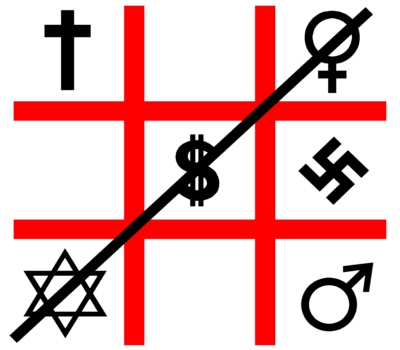
|
Excerpts fromPrisoner’s DilemmaWilliam Poundstone |
VOLUNTEER’S DILEMMA EXPERIMENTS
It is possible to play the volunteer’s dilemma as a party game. Pass out slips of paper to a group and tell everyone to write either “$1.00” or “10 cents” on the paper. Provided at least one person writes “10 cents,” everyone gets the amount he wrote. If everyone writes “$1.00,” no one wins anything.
A volunteer’s dilemma experiment was announced in the October 1984 issue of Science 84 magazine. Readers were invited to send in cards asking for $20 or $100. The editors’ original idea was that everyone would win what he asked for provided no more than 20 percent of the entries asked for $100.
In an offer like this, everyone can and should enter, asking for $20 at least. If everyone cooperates by asking for $20, everyone wins $20. But there is also room for some people to be greedy and ask for $100. As long as not too many people are greedy, each defector wins $100 and in no way hurts anyone else. The catch is that if too many people are greedy, no one gets anything.
A troubling thing about this and other volunteer’s dilemmas with many participants is that individual defectors have little to feel guilty about. With thousands of participants, the chance that one’s defection will be the one that puts the fraction of defectors over the 20 percent threshold is remote. Chances are either that the percentage of defectors will be well under 20 percent – in which case one’s defection doesn’t hurt anyone – or it will be well over 20 percent, in which case no one was going to win anything anyway. Of course, if everyone thought that way....
The magazine’s publisher, the American Association for the Advancement of Science, chickened out over the money offer – though not before trying unsuccessfully to get Lloyd’s of London to insure against a payout. Staff writer William F. Allman offered to put his future salary on the line as “collateral,” but to no avail. The publishers stipulated that no money would be awarded; readers were merely asked to act as if the offer was as stated.
The magazine received 33,511 entries – 21,753 people asked for $20, and 11,758 asked for $100. The defection rate was 35 percent, meaning that the publishers could have safely offered the money. It’s hard to say if this defection rate is typical. The contest was announced in connection with an article on cooperation, which might have predisposed people toward cooperating. The craven refusal to offer real money might have been a factor, too. Isaac Asimov wrote in: “A reader is asked to check off $20 and consider himself a ‘nice guy,’ or check off $100 and consider himself not a nice guy. In such a case, everyone is going to take that option of pinning the nice guy label on himself, since it costs no money to do so.”
A lot of people enter contests without paying much attention to the rules, and there may have been some “naive” entrants asking for $100 in addition to the “premeditated” defectors. One defector quoted Blanche DuBois: “I’ve always depended on the kindness of strangers.”
A total of $1,610,860 was requested. Had everyone who entered asked for $20, the payout would have been $670,220. The maximum that 33,511 people could have won, assuming that just under 20 percent asked for $100, is $1,206,380.
William Poundstone, Prisoner’s Dilemma, Doubleday, NY 1992, pp. 203-205.